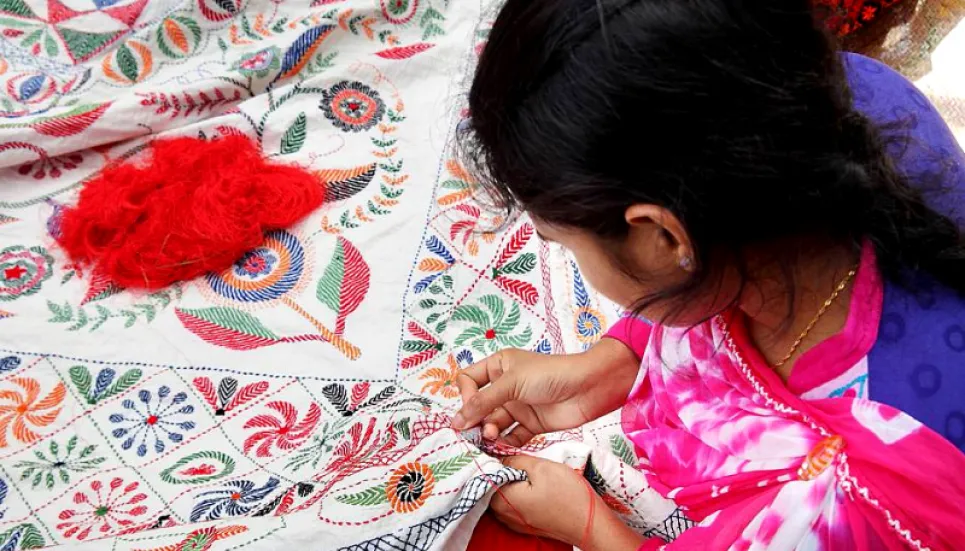
The under-construction "Sheikh Hasina Nakshi Palli" in Jamalpur has appeared to be a dream factory for thousands of women entrepreneurs as the village will offer raw materials at reasonable prices and easy access to national and international markets.
"We all are excitedly waiting for the opening of the Palli. It could turn our wheel of fortune by providing access to local and international markets. We will be able to sell our products directly at fair prices to bigger markets," said Shilpi Akhter, an entrepreneur of Jamalpur Sadar who works with different kinds of traditional handicrafts.
Bangladesh Handloom Board under the ministry of textiles and Jute is implementing the project based on handloom and handicraft products named after Prime Minister Sheikh Hasina on 300 acres of land at Melandaho and Sadar upazilas of Jamalpur district.
The project aims to create employment opportunities, especially for women, through rehabilitating the weavers and Nakshi entrepreneurs, supplying raw materials at reasonable prices, using local jute products in the handloom industry and utilizing the talent of local artists. Shilpi, a third-year Honours student of the local Government Ashek Mahmud College in Jamalpur town, said, currently, she bears her education expenses and pocket money by selling her Nakshi products.
"I have a dream to become a renowned entrepreneur by producing different handlooms after my study. But, we need patronization and our own marketplace to sell the products which are thwarting the cottage industry from flourishing," she said. Shilpi thanked Prime Minister Sheikh for taking the initiative to set up a huge cottage village here and creating job opportunities for hundreds of women entrepreneurs.
In March 2019, the Executive Committee of the National Economic Council (ECNEC) approved the 'Sheikh Hasina Nakshi Palli, Jamalpur (1st phase) Project' involving Tk 722 crore in a bid to enhance the civic facilities of the handloom workers in Jamalpur that has already been branded nationwide for nakshi katha and other handicrafts products.
Habsha Khatun, a mid-aged women entrepreneur of the district said, the handicraft industries in Jamalpur are basically small and medium enterprises that created many job opportunities for the poor rural women. "But, in many cases, it's not being possible for the small and medium enterprises to set up their own sales centres. The proposed Sheikh Hasina Nakshi Palli is designed to set up permanent sales outlets for the women entrepreneurs to ensure the sustainability of their business," she said.
While the project had got a nod in ECNEC, planning minister M A Mannan said that Nakshi kanthas had bright prospects abroad and once the project is implemented, the handloom and Nakshi workers would be facilitated to a great extent. Since the Nakshi and handloom workers in those areas are passing their days in difficulties like financial hardship, marketing problems and lack of patronization, the ministry moved the project proposal and thus it got ECNEC approval, he said.
According to the Planning Commission, Nakshi kantha is commonly known as the brand of Jamalpur and some 300 Nakshi entrepreneurs are producing their products in all upazilas in the district including Bakshiganj, Dewanganj, Madarganj, Islampur, Melandhoho and Sadar upazilas. Some 261 handloom families live in Jamalpur and Sherpur districts while there are also some 76 Nakshi entrepreneurs and 3,985 Nakshi artists in Sherpur.
Once completed, the 300-acre hub would accommodate almost 1,200 entrepreneurs while tripling the production of embroidery items in the country. However, the president of Jamalpur wing of the National Association of Small and Cottage industries of Bangladesh (NASCIB) M Shahinur Alam claimed that there are 2500 large handicraft entrepreneurs in the district while nearly 4.5 lakh women and men have been directly or indirectly involved in the industry.
He said there are many small and big showrooms of this industry in Jamalpur district town, but due to marketing problems, lack of patronage and lack of capital, women workers are being deprived of a fair price for their labour.
The Sheikh Hasina Nakshi Palli would help the nakshi kantha of Jamalpur to play a special role in creating the lifeblood of the country's economy after the country's garment industry. From ancient times, the application of the artistic pattern with reflection on life, aspirations, and culture of the village in the art of needlework and hand embroidery has been practised by Bangladeshi poor women in the part of rural areas their family use. Once destined for family use, Nakshi designs on quilts, bed cover, kameez, cushion covers, saree, Punjabi, T-shirts, tops, skirts, yoke, purses, pillow covers, saree pier, shawl sheet are now the centre of a flourishing cottage industry, once that has transformed many a housewife into an entrepreneur.
The country's fashion brands like Arong, Bengal gallery, Kumudini, and Mayasir have experimented extensively with the Nakshi Kantha while different exhibitions have been organized to show this significant traditional heritage with needle motifs work to consumer level in home and abroad.